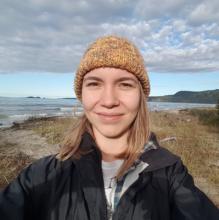Esther Roorda
Why did you decide to pursue a graduate degree?
I worked in industry in my area of research (FPGAs) for a few years after my undergraduate degree, and while I learned a lot of practical skills in industry, I wanted to expand my understanding of the context and uses of the technologies that I was working on. Computing is such a quickly evolving area, and there is just so much to learn and read! I felt that a graduate degree offered the opportunity to broaden my scope of understanding, to learn from experienced researchers, and to contribute to exciting research in my field.
Why did you decide to study at UBC?
UBC is one of the top universities in Canada for reconfigurable computing and FPGA research. It has world-class faculty and a good selection of interesting classes. Visiting campus also helped me to make this decision: UBC has an amazing campus and Vancouver is a really beautiful city.
What is it specifically, that your program offers, that attracted you?
I was specifically interested in working with my advisor, Dr. Steve Wilton, who is an expert in the field of reconfigurable computing, and a very experienced and supportive supervisor. I also liked the rest of the research group, and the lab had a fun, friendly working environment.
What was the best surprise about UBC or life in Vancouver?
I really like that the campus is so beautiful and close to nature. It is just a few minutes walk to the beach or to the forest, and it's not unusual to see eagles, seals and other wildlife on campus.
What aspects of your life or career before now have best prepared you for your UBC graduate program?
Before coming to UBC, I worked as a software engineer for a few years. This helped me to develop practical technical skills and a solid understanding of the tools that I rely on in my research, which has been really useful. I think spending some time in industry also helped me to appreciate the different opportunities that are available to students and in academia versus in industry.
What do you like to do for fun or relaxation?
I like hiking and camping during the summer. I’ve recently started learning to play drums, and joined the UBC climbing gym, which has been fun so far.
What advice do you have for new graduate students?
There are a lot of opportunities available on campus, including scholarships, research talks, competitions, workshops, volunteer opportunities and clubs, that I’ve found really fun and/or useful. Having all these different opportunities is one of the nice things about graduate school and I’d recommend new graduate students to try to take advantage of them.
